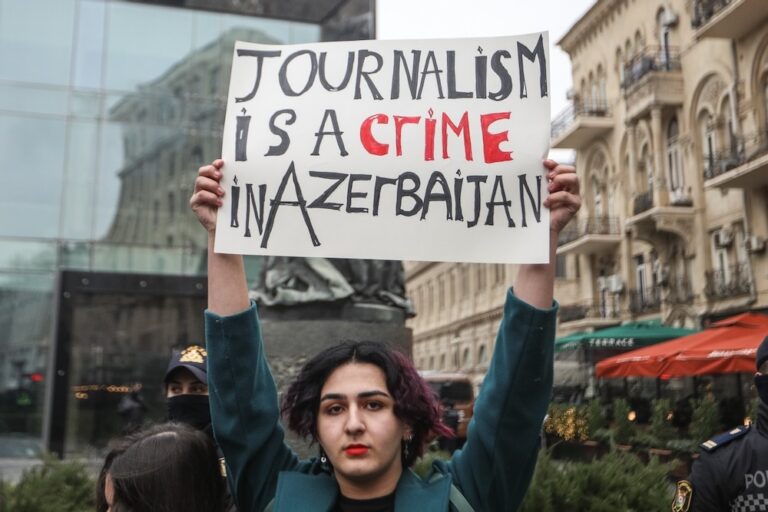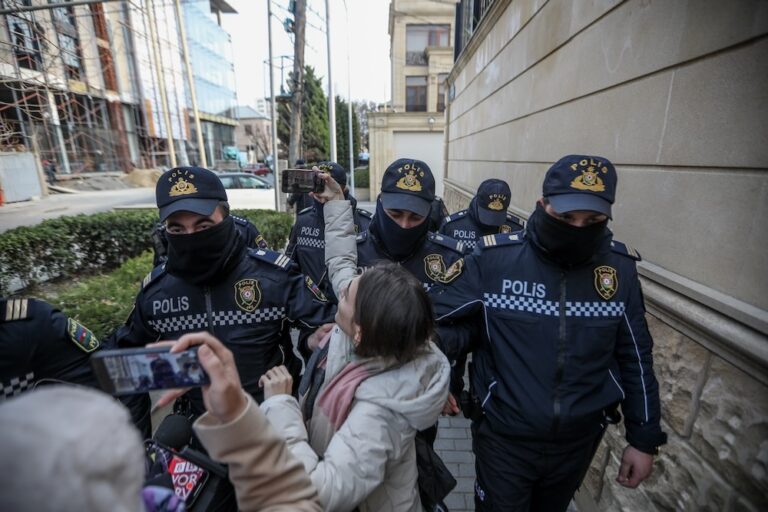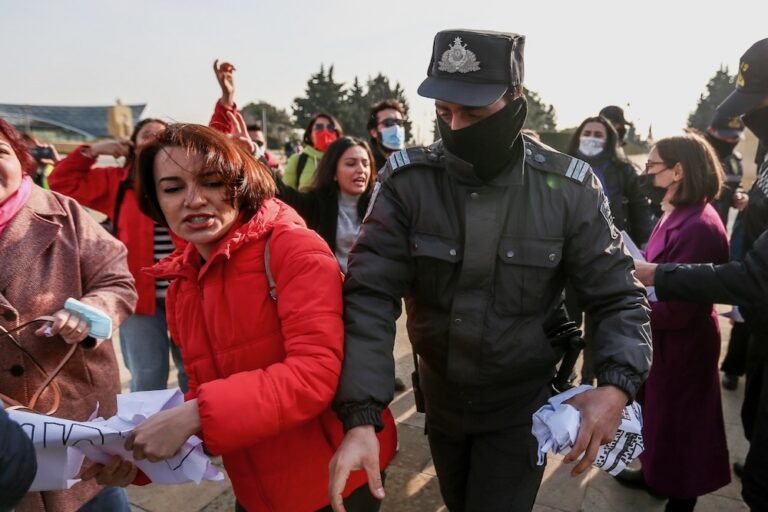An important visit abroad is making human rights defenders very cynical about Azerbaijan's 'amnesty'.
This statement was originally published by the Institute for Reporters’ Freedom and Safety (IRFS) on 21 March 2016.
The March 17 limited release of political prisoners in Azerbaijan leaves many others in prison and is undermined by the ongoing arrests and imprisonment of activists, the Institute for Reporters’ Freedom and Safety (IRFS) said today. Azerbaijan’s international partners should demand the release of all political prisoners and an end to repression of civil society.
“Amnesties that are happening against a backdrop of ongoing human rights abuses cannot be called a step forward. The pattern of arbitrary arrests and politically motivated trials is continuing. By releasing 15 out of dozens wrongfully convicted activists, Azerbaijani authorities are making room in jails for new political prisoners. This revolving door of political prisoner releases and convictions needs to stop”, comments IRFS director Emin Huseynov.
In the meantime, IRFS welcomes the European Court of Human Rights ruling on Rasul Jafarov v Azerbaijan (no 69981/14) as a timely reminder that Azerbaijan faces a deepening human rights crisis.
The Court ruled that the detention of human rights defender Rasul Jafarov violated international human rights law. Several hours after the ruling became public, Jafarov, wrongfully imprisoned for 593 days, was pardoned by presidential decree.
Along with Jafarov, 14 other political prisoners, including prominent human rights defender Anar Mammadli and journalist Tofig Yagublu, have been released by presidential pardon. However, dozens of outspoken critics of the regime, including journalist Khadija Ismayilova, human rights defender Intigam Aliyev, and leader of the Republican Alternative movement Ilgar Mammadov remain behind bars.
On March 17, well-known journalist Rauf Mirgadirov was also released under a suspended sentence by a decision of the Court of Appeal. Mirgadirov, a critic of Aliyev’s government, was deported from Turkey and arrested in Azerbaijan on allegations of espionage for Armenia. On December 28, 2015 a court in Baku sentenced him to six years imprisonment. IRFS believes that Mirgadirov’s release on suspended sentence was commuted on the orders of the executive branch, as “evidence” before the Western community of judicial independence in Azerbaijan.
Human rights defenders Leyla and Arif Yunus, jailed as part of Mirgadirov’s case, were also released under suspended sentences by a decision of the very same appellate court in December 2015.
IRFS regards the pardoning of journalists and human rights defenders as an attempt by the regime to increase chances for a possible visit to White House under the auspices of the Nuclear Security Summit. Notably, the pardon decree came four months after U.S. Representative Chris Smith (D-NJ) introduced the Azerbaijan Democracy Act (H.R.4264), which would deny U.S. visas for senior Azerbaijani officials, their immediate family members, other officials directly involved in human rights abuses, and individuals financially benefitting from human rights violations.
By releasing only a handful of political prisoners out of dozens, the authorities have proven once again that they are unwilling to invest in a law-bound state, develop civil society or to respect fundamental human rights.
“Concurrently with the release of some political prisoners, the authorities are jailing others, maintaining the atmosphere of fear in order to continue to maximize political power and secure their own corrupt interests,” Emin Huseynov said. “At the same time, the authorities are using the release of another group of political prisoners as an alleged “goodwill gesture” and commitment to human rights, aimed at winning the approval of Western countries to improve their legitimacy and tainted international image”, said Huseynov.
“Innocent people should not go to prison on political orders, and then be released by the very same people who have just condemned them to years behind bars,” said Huseynov.
Those who questioned the legitimacy of Ilham Aliyev’s third presidential term have particularly been targeted by the regime. Specifically, in February 2013, the authorities arrested well-known public figure Ilgar Mammadov, who condemned the hasty constitutional amendment to abolish the presidential term limit as anti-constitutional and anti-democratic. Mammadov was thrown into jail 7 months before Aliyev ran for the third term in office. Almost two years after the European Court ruling overturning his conviction, Mammadov remains in jail.
In another example, less than a month after the presidential elections in 2013, the head of the Election Monitoring Center Anar Mammadli and his colleague Bashir Suleymanli were arrested for publishing a report which revealed large-scale electoral fraud.
Questioning the legitimacy of the election results cost the human rights defenders their freedom.
Human rights defender Intigam Aliyev also fell victim of the regime as he called into question the legitimacy of the judicial system by winning dozens of lawsuits against the Azerbaijani authorities at the European Court. When investigative journalist Khadija Ismayilova refused to cease her work exposing multibillion-dollar corruption schemes among the higher political elite and their families, she was also put behind bars.
The members of civil society who were not jailed faced intolerable conditions. From mid-2014 until now, civil society is unable to implement projects, hold public debates, or receive grants and donations.
By introducing a raft of absurd legal restrictions, which demand registration of foreign donors and registration of grant contracts in complex and often arbitrarily implemented procedures, the authorities have prevented foreign donors from providing grants, and, in turn, local organizations from receiving funding. To this day, the Ministry of Taxes, the Prosecutor General’s Office and the Ministry of Justice continue dozens of politically motivated inspections and criminal cases against independent NGOs.
Bank accounts of human rights activists and journalists have been illegally frozen, steep fines have been imposed against some of them, and several civil society activists are still prevented from traveling abroad.
The Parliament is discussing legislative changes that will allow the authorities to refuse to fulfill their human rights obligations, in particular the decisions of international courts such as the European Court of Human Rights.
In this unbearable context, there seems little possibility that civil society will survive.
IRFS believes that the pardoning of some critics of the regime is partly the result of pressure from the West on the Azerbaijani authorities. However, IRFS calls on the international community to maintain and increase this pressure in order to achieve the release of all political prisoners without exception. The international democratic community should not accept the March 17 release of a group of political prisoners as a serious positive policy change, given that the government continues its practice of politically motivated arrests. First and foremost, a liberal regulatory environment, which will allow alternative voices to develop in the country, must be created before the government can be taken seriously in this regard.
IRFS also calls on international financial institutions not to believe empty promises by the authorities about strengthening the fight against corruption and enhancing transparency, made during the last few months in various bilateral meetings. Now, amid a serious economic crisis, caused by bad governance and exacerbated by the global decline in oil and gas prices, the Azerbaijani authorities are more dependent than ever on the international community. IRFS calls on international financial institutions to refrain from giving out loans to the authorities. Without serious reform, these funds will not go to the country’s development but will strengthen the authoritarian rule.
International loans without any accountability of the authorities will increase the existing web of corruption in Azerbaijan.
IRFS also calls on the EITI to send an observation mission to Azerbaijan and to carefully and comprehensively examine the extent to which the country’s restrictive legislation actually allows all NGOs (irrespective of EITI membership) to fully participate in the process aimed at strengthening the transparency and accountability of authorities. In case of non-compliance, EITI should apply the most stringent sanctions, including expulsion from the organization.
IRFS also calls on the Secretary General of the Council of Europe and the Council of Europe’s Committee of Ministers to give a principled assessment of Azerbaijan’s compliance with its obligations under the European Convention on Human Rights, as well as to seek the implementation of the Court’s decision in the case of Ilgar Mammadov. If the Azerbaijani authorities fail to engage in a real dialogue on this, IRFS supports the use of sanctions.
IRFS calls on the authorities to release all political prisoners to end impunity for crimes against government critics, to implement urgent reforms in the field of the rule of law, fundamental human rights and transparency, to bring about real accountability of the authorities and democratic change. Only then will the country’s sustainable development be possible.
By releasing 15 out of dozens wrongfully convicted activists, Azerbaijani authorities are making room in jails for new political prisoners.
…the authorities are using the release of another group of political prisoners as an alleged “goodwill gesture” and commitment to human rights, aimed at winning the approval of Western countries to improve their legitimacy and tainted international image.



